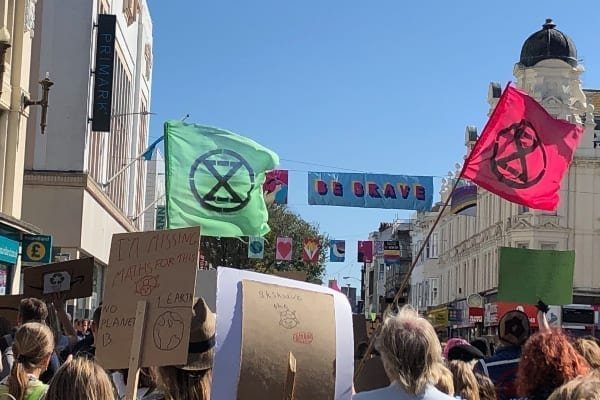Rally for the imagination
On Friday 27 September, the final day of Global Strike for Climate, Culture Declares Emergency teamed up with Architects Declare Emergency and Music Declares Emergency, along with their 2000+ signatories, to host a ‘Rally for the Imagination’ in Trafalgar Square.
The rally was in response to Caroline Lucas’ Letter to the Earth, in which she says that although it’s ‘not an easy thing to admit… politics has failed’ in addressing the urgent action needed to tackle the climate and ecological emergency. She goes on, ‘Political failure is, at root, a failure of imagination’.
Asking for direct help from the Culture sector, Caroline Lucas asks artists to ‘paint the positive pictures of how the world could be – and to tell the vivid and compelling stories that show us that, when people come together and act, there is always hope’.
The rally opened with Caroline’s Letter, followed by responses from artists, designers, musicians, campaigners and cultural leaders.
Speakers included Sam Lee, award-winning folk singer and musician; Rakaya Fetuga, Roundhouse Slam Winner and Resident Artist; Farhana Yamin, leading international environmental lawyer and climate change and development policy expert; Michael Pawlyn, lead architect on the Eden Project and passionate advocate of regenerative design; Tree Sisters, the global tropical forest restoration network; Chris Garard, director of divestment campaigners Culture Unstained; Helen Paris of Curious Performance and Jarvis Smith, star of reality TV series Dumped and co-founder of My Green Pod.
Speakers at the rally sowed the seeds for creative individual and collective responses to the emergency, giving examples of creative work already underway.
A letter closing the rally called on the Arts Council to place the Climate and Ecological Emergency directly at the heart of its 2020-2030 year strategy.
It asks the Arts Council to look at how culture can support the necessary re-imagining of our future and how people, communities, nations and planet can mitigate the worst of the impacts, adapt to them and help reduce suffering.
Escalating climate action
Over the next 12 months, a series of escalated actions are being planned in different regions of the globe to continue to exert pressure on governments.
Joel Enrique Panichine, organiser from Fridays for Future Chile – the country that will host the next UN Climate Summit in December (COP 25) – said the movement in Latin America won’t stop until the world leaders hear them and concretely start phasing out fossil fuels.
He said: ‘Today in Chile we marched from Arica to Punta Arenas, where people of all ages, organisations and institutions gave their voice, a voice that bravely rises to ask politicians of the world for no more double speeches and more actions that seek the ‘good living’, or as they say in my community, the küme mongen’.
Joel self-identifies as part of the Mapuche people and says that fighting for the climate also means honouring the values of all indigenous peoples and traditional communities around the world.
The week in numbers
From 20 to 27 of September, 1.4 million people took to the streets in Germany, over 1 million in Italy, over 600,000 in Canada, over 500,000 in the United States, 350,000 in Australia and another 350,000 in the United Kingdom, 195,000 in France, 170,000 in New Zealand, 150,000 in Austria, 50,000 in Ireland, 70,000 in Sweden, 42,000 in the Netherlands, 20,000 in Brazil, 21,000 in Finland, 15,000 in Peru, 13,000 in Mexico, 13,000 in India, 10,000 in Denmark, 10,000 in Turkey, 10,000 in Pakistan, 6,000 in Hungry, 5,000 in South Korea, 5,000 in Japan, 5,000 in South Africa, over 3,500 in Chile, 3,000 in the Pacific, 2,000 in Singapore and much more, as the final count is not yet confirmed.
Click here to read our article about how UK banks continue to fund climate disaster.
 Play Video about This Rock Might Just Save The World
Play Video about This Rock Might Just Save The World Play Video about Play 2 hours of rock
Play Video about Play 2 hours of rock Play Video about Play 2 hours of brook
Play Video about Play 2 hours of brook Play Video about Play 2 hours of sheep
Play Video about Play 2 hours of sheep











































